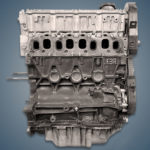The 3.6-liter Volkswagen CMTA 3.6 FSI engine was produced by the company from 2013 to 2018 and was installed only on the second generation of the popular Touareg crossovers. This power unit is essentially a deformed version of the engine with the CGRA index.
The EA390 series includes: AXZ, BHK, BWS, CDVC, CMTA, CMVA.
Specifications
| Production years | 2013-2018 |
| Displacement, cc | 3597 |
| Fuel system | direct injection |
| Power output, hp | 250 |
| Torque output, Nm | 360 |
| Cylinder block | cast iron VR6 |
| Block head | aluminum 24v |
| Cylinder bore, mm | 89 |
| Piston stroke, mm | 96.4 |
| Compression ratio | 12.0 |
| Features | no |
| Hydraulic lifters | yes |
| Timing drive | chain |
| Phase regulator | on both shafts |
| Turbocharging | no |
| Recommended engine oil | 5W-30 |
| Engine oil capacity, liter | 6.7 |
| Fuel type | petrol |
| Euro standards | EURO 4/5 |
| Fuel consumption, L/100 km (for VW Touareg 2013) — city — highway — combined |
14.5 8.8 10.9 |
| Engine lifespan, km | ~350 000 |
| Weight, kg | 188 |
The engine was installed on:
- Volkswagen Touareg 2 (7P) in 2013 – 2018.
Disadvantages of the VW CMTA engine
- The engine is free from most of the diseases of the series and is considered reliable;
- The main problems of the motor are associated with the formation of carbon deposits on the intake valves;
- In the crankcase ventilation system, the membrane often fails and requires replacement;
- On runs of more than 200,000 km, timing chains often stretch and begin to rattle;
- The rising oil level and the smell of gasoline under the valve cover hints at a fuel injection pump leak.






